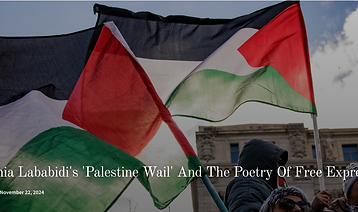In June 2024 Pantheon published Tehrangeles, Porochista Khakpour’s latest novel (see WLT, Sept. 2024, 73). The novel satirizes social media culture and turns the lives of four Iranian American influencer sisters upside down as they are faced with the pandemic and their own secrets and shortcomings, beneath the perfect avatars they had hoped to display for reality audiences to admire. The novel was named a Best Book of the Year So Far by Vogue, Harper's Bazaar, Vanity Fair, and W Magazine and a Most Anticipated Book of the Year by TIME, New York Post, The Week, The National, Nylon, Bustle, Our Culture, Lit Hub, The Millions, Electric Literature, Katie Couric Media, Seattle Times, Chicago Review of Books, Alta Journal, Write or Die, and Library Journal.

Every Fourth of July, I question my American friends’ patriotism. I email them Independence Day congratulations, attached with pictures of the American flag. Many of my American friends don’t show much interest in my Fourth of July congratulations. Like my friend Sam. He thinks differently about the idea of the flag, national anthem, and patriotism. Sam believes that the flag is not sacred; it’s just a symbol. He says he doesn’t need to wrap himself in the US flag to demonstrate that he is a patriot. To him, patriotism is more than just following a flag and cheering for the politicians who wave it. Although Sam was born and raised in a military family with right-wing political views, he is very leftist.

“What is a country? A country is a piece of land surrounded on all sides by boundaries, usually unnatural. Englishmen are dying for England, Americans are dying for America, Germans are dying for Germany, Russians are dying for Russia. There are now 50 or 60 countries fighting in this war. Surely so many countries can’t all be worth dying for.”
Delphine Minoui
I’m Writing You from Tehran
(FSG, 2019)
These lines from Joseph Heller’s Catch-22 always bring tears to my eyes and grief to my heart. It reminds me of my classmate, Sahar, who was arrested in 2015 and has been a political prisoner ever since. She and I weren’t very close, but reading literature connected us.

"The opposite of love is not hatred but indifference." I read this quote by Holocaust survivor Elie Wiesel in Palestine Wail, a new book of poetry by Yahia Lababidi, and it took me back to Tehran and the years I had been a journalist there, living in a closed society ruled by a brutal regime. At that time, I often read the work of Iranian writer, poet and political activist Mohammad Mokhtari, who was not indifferent about the pain and suffering of others who didn't even speak the same language as he did or were citizens of a country that were considered an enemy of his.

Years ago, I had a pen pal, a man who wrote to me—in Tehran—sporadically for about a year, from a refugee camp in Turkey. We were Facebook friends—friends of friends—though sometimes I wondered about our connection on Facebook because all his posts were written in Kurdish, which I barely understood. My friend—Aras—was born and raised in Marivan—a city in Kurdistan province in Iran. He was a Sunni Muslim by birth, though he seemed very secular and also far left. I guess we were the same age; however, I never asked him. I don’t know precisely when and why, but something connected us, and we started exchanging long messages on Facebook—letters.

I have a deep bond with the literature that was recommended to me by the man I used to love. Some of the books he passed along I rejected out of hand—books such as Never Let Me Go and The Cement Garden and Child of God. Knee-jerk reactions to literature are one of my bad habits, then and now—but my beloved was patient with me. He enjoyed playing tricks on me, and he used tricks to encourage me to read. These tricks were clever and varied. It would begin with finding ways to put me in a story’s situation, such as that of Jenny in An Education. Or he would suggest that we watch a film adapted from a book he thought I should read, such as The Danish Girl. My beloved would sometimes make me terribly jealous by mentioning his female friends, who had read the books he liked.

The story of how I met Richard Brautigan in Tehran begins in 2011, when I attended a film workshop where many American movies were shown and analyzed by Iranian critics. One of the films presented was Oliver Stone’s Platoon (1986), which, I believed, depicted the truth of the Vietnam War and the traumas suffered by American soldiers, and to be honest, Platoon was the only reason I attended the workshop in the first place.

When the young Iranian painter Manoucher Yektaei arrived in New York, he asked the painters he encountered what their artistic principles were. He was told that paintings with no subject were preferred. But as an Eastern dreamer, Yektaei could never escape his memories, and he didn’t try. Maybe that’s why Willem de Kooning—inspired by Yektaei’s work—began painting images based on real-life figures. In this way, Yektaei signed his name to the bottom of the New York School of Abstract Expressionism.

I could probably read only authors from Vermont from now until I die and never run out of good books. So, I’m always wary of publishing a group of writers from one country and mistakenly giving the impression that that sliver should be somehow representative of the whole. As if a group of five or nine or a hundred writers could give even an inkling of what a country’s literary culture, let alone its history, might be, and as if understanding a literature is even possible.
